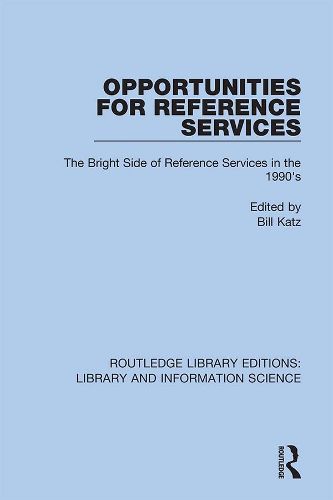Readings Newsletter
Become a Readings Member to make your shopping experience even easier.
Sign in or sign up for free!
You’re not far away from qualifying for FREE standard shipping within Australia
You’ve qualified for FREE standard shipping within Australia
The cart is loading…






This book, first published in 1991, explores the changing roles of reference services and offers advice and practical ideas to guide librarians through the increasingly tangled maze of duties being thrust upon the reference staff. Although the everyday work of the reference librarian is often taken for granted, these insightful chapters illuminate the essential service performed by the reference librarians as they facilitate access to information for a wide variety of users. Furthermore, this book helps reference librarians face the future by examining the technological and service developments that will challenge their profession.
It addresses unique reference problems such as making use of the telephone as an information gathering tool, selecting reference material for the interdisciplinary field of Health, Physical Education, and Recreation (HPER), and helping non-law students with legal research. Topics related to information systems are examined such as the limitations of end-user online services, and an evaluation of the Library of Congress Information system. Authoritative contributors make recommendations on how to design services to coordinate with the new technology and how to change librarians’ roles so they can assist people in using these systems.
$9.00 standard shipping within Australia
FREE standard shipping within Australia for orders over $100.00
Express & International shipping calculated at checkout
Stock availability can be subject to change without notice. We recommend calling the shop or contacting our online team to check availability of low stock items. Please see our Shopping Online page for more details.
This book, first published in 1991, explores the changing roles of reference services and offers advice and practical ideas to guide librarians through the increasingly tangled maze of duties being thrust upon the reference staff. Although the everyday work of the reference librarian is often taken for granted, these insightful chapters illuminate the essential service performed by the reference librarians as they facilitate access to information for a wide variety of users. Furthermore, this book helps reference librarians face the future by examining the technological and service developments that will challenge their profession.
It addresses unique reference problems such as making use of the telephone as an information gathering tool, selecting reference material for the interdisciplinary field of Health, Physical Education, and Recreation (HPER), and helping non-law students with legal research. Topics related to information systems are examined such as the limitations of end-user online services, and an evaluation of the Library of Congress Information system. Authoritative contributors make recommendations on how to design services to coordinate with the new technology and how to change librarians’ roles so they can assist people in using these systems.